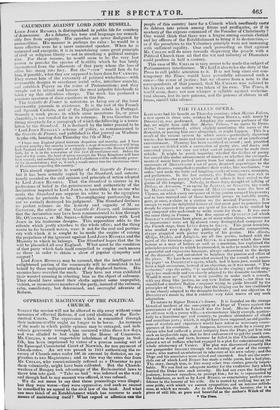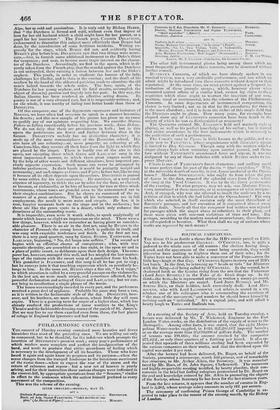THE ITALIAN OPERA.
Lar.Lacits had his benefit on Thursday evening; when Marino Faliero, a IleW opera in three acts, written by Signor Dunne, with music by DONIZETTI, was performed. Adopting the common parlance of the day, we might have said that Marino Faliero, " an opera by DOM.. zurri," was performed ; either slightly mentioning the name of the dramatist, or passing him over altogether, as might happen. This is a result of the vicious system by which music—particularly theatrical music—has become more and more a sensual in place of an intellectual entertainment. Meaning has been sacrificed to sound ; and, provided our ears arc tickled with a succession of pretty airs, and duets, and concerted pieces, we care not what sort of jargon may be made their vehicle. It might be worth inquiring whether the decline of poetry has caused this undue advancement of music ; or whether the encroach- ments of music have pushed poetry from her stool, and rendered the successors of MErAsrAsto a set of poor, despised appendages to the Italian theatres, compelled to produce their works, like mechanics, " to order,"and made the butts and laughing-stocks of composers, managers, and performers. In the last century, the Italian stage was rich in lyrical poetry—the poetry which above all others is best suited to the genius of the language. Nobody, in those days, thought of talking of Didone, or ilriaserse, " an opera by JomE1.1.1, or GALUPel, the words by METASTASIO." The operas of METAsr ASIO were the bow of Ulysses, on which every composer of rising genius essayed his powers; and to have married one of those beautiful poems to suitable music, gave, at once, a claim to a station on the musical Parnassus. It is enough to read the delightful letters of that great poet to peiceive how deeply he expected the genius and spirit of his works to be studied by any composer who undertook to write music for them. It was once the same thing in France. The fine operas of QUINAULT (of which BOILEAU'S criticisms have given, as of many other things, so erroneous an impression) were set by almost every distinguished composer for the French stage, from Lui.1.1 down to GLuce. This great musician, who studied very deeply the philosophy of dramatic composition, always grappled with poetry worthy of his genius. His Alcesta, CEdipe Orphje, and iphiyilnie, are all fine poems, imbued with the spirit of the Grecian stage ; and GLUCK, in a manner which does him honour as a man of letters as well as a musician, has explained the principles according to which be proceeded, in order to render his music a powerful and expressive language, always subservient to the design of the dramatist, and calculated to heighten the passion and effect of the piece. We have been somewhat amused by the remark of a morn- ing paper,' on DoNizerres opera, which, had it been just, would have been a high encomium, instead of an objection as it was meant. " The orchestra," says the critic, " is sacrificed to die singing; and the sing- ing is too studiously and too closely adapted to the dramatic incidents." Would it were so! would it were possible to make such a remark, with any thing like justice, on any new Italian opera !—for then we should find a modern Italian composer trying to guide himself by the principles of GLuce. We deny that the singing can be too studiously or too closely adapted to the dramatic incidents ; and our objection to DONIZETTI'S Music is, that it exhibits very faint traces of any such adaptation. To return to Signor BIDERA'S drama. It is founded on the strange historical incident of the conspiracy of a Doge of Venice against the government of which he himself was the head. Marino "'diem was an old man with a young wife,—a circumstance likely enough, particu- larly in a licentious age and country, to produce abundance of ribald and scurrilous jests; which, it might have been supposed, an old gentle- man of wisdom and experience would have taken as necessary conse- quences of his condition. A lampoon, however, made by a young pa- trician who had suffered a great indignity from the Doge' put him into such an implacable rage, that he first endeavoured to get the youth con- demned to death, and then, because he failed in this Christian object, joined a set of ruffians who had engaged in a plot for exterminating the whole aristocracy of Venice. The plot was discovered (exactly like our gunpowder treason) through the relenting of one of the conspi- rators, who warned an aristocrat to take care of his own safety; and the Doge and his associates were seized and executed. Such are the mate- rials out of which Lord Bvaoy has made a noble poem, but a bad play. The story, though true, is like many other true stories, grossly impro- bable. We can find no adequate motive for the vindictive fury which hurried the Duke into such atrocity. He had not even the feeling of jealousy, however causeless, to prompt him ; for he is represented by the historians, as well as by Lord /3vaos, as entertaining perfect con- fidence in the honour of his wife. He is moved by nothing but an in- sane pride, with which we cannot sympathize, and an intense selfish- ness, at which we revolt. As to the Dutehess, the heroine, she is a piece of still life, as pure and beautiful as the author's Witch of the
• The roses.
Alps, but as cold and passionless. It is truly said by Bishop HEBER, that "the Dutchess is formal and cold, without even that degree of love for her old husband which a child might have for her parent, or a pupil for her instructor." The French poet, CASIMIR DELAVIGNE, endeavoured to dramatize this subject more effectively than BYRON had done, by the introduction of some fictitious incidents. Writing ex- pressly for the stage, which BYRON did not, and evidently having BYRON'S play before him, DELAVIGNE saw that two things were neces- sary,—first, to furnish some additional incitement to the Duke's thirst for vengeance ; and next, to bestow more tragic interest on the charac- ter of the Dutchess. Accordingly, we find in the opera, which is di- rectly taken from the French play, that the scandal against the Duchess is not unfounded, there existing a liaison between her and the Duke's nephew. This youth, in order to vindicate the honour of the lady, challenges her libeller, and is slain in the combat ; and the death of his nephew by the hand of this abhorred patrician tends to stimulate the old man's hatred towards the whole order. The love, again, of the Datehess for her young nephew, and its fatal results, accomplish the object of throwing passion and tragedy into her part. In this way, the
Italian libretto has been rendered an effective acting drama. Its poetry is not of a very elevated east, but it is respectably written ; and, on the whole, it was worthy of falling into better hands than those of Doelzerre
Of this composer, one of the degenerate successors and imitators of ROSSINI, we have often had occasion to speak in a manner becoming his deserts; and this new sample of his genius has given us no cause to qualify any of our opinions respecting him. We consider Marino Faliero as filling considerably below his previous work, Anna Bolena. . We do not deny that there are prcttinesses in both ; but in this opera the prettinesses are fewer and further between than in the former. Dos:ea:Tees melody has no distinctive character; it is made up of the mere commonplaces of the Rossinian school. His airs have all one colouring—or, more properly, no colouring at all. Cameleon-like, they receive all their hues from the light in which they are placed by the singer. There is hardly one of the airs in this opera, not excepting those which Glum and Lanaciir sang in the most impassioned manlier, to which these great singers could not, by the help of other words and different situations, have imparted pre- cisely opposite expression. Such music can never be attempted by inferior performers. In their hands it would be perfectly insipid and unmeaning ; and such singers as Geist, and PASTA before her, like to sing at because all its effect depends upon themselves. DONIZETTI is praised by some critics for his ins( rumentation. He contrives, at a very small expense of ingenuity, to tickle the ear by solos for the flute, or clarinet, or bassoon, or violoncello, or by bits of harmony for two or three wind- instruments, whose tones are grateful even to the uninstructed ear in their simplest combinations. But he shows no command of the re- sources of a great orchestra. When all his instruments are in full employment, the result is mere noise and strepito. He has, it is true, happier moments both on the stage and in the orchestra ; but these are like the green spots in a desert, which only enhance the dreariness of the surrounding waste.
It is impossible, even were it worth while, to speak analytically of music which leaves so slight an impression on the mind. There were a few things, however, which we remember as having given us consider- able pleasure. There is an air in the first act, sung by RUBINI in the character of Fernando the young lover, which is pathetic in itself, and was sung with exquisite tenderness and finish. In the first act too, there is a very good quartett, sung by GRISI, RUBIN!, Taatauerarr, and LABLACHE, beginning, " No, del bingo mio soffrire." The second act begins with an effective chorus of conspirators; who, with true operatic absurdity, are assembled on a fine night, in the open air and in a place of public resort, to deliberate upon their dark design. The com- poser has, however, managed this well, and has mingled the low mutter- ings of the traitors with the sweet song of a gondolier from his bark. This gondolier is IVANHOFF, and this song is all he has got to sing; but he conveys into it that touching expression which so peculiarly be- longs to him. In the same act, RUBIN' sings a fine air, "Jo ti veggo," to which attention is called by a very graceful passage on the violoncello. In the last act, we were much struck, and sometimes affected, by the powerful declamation and acting of Geist and LABLACHE; but we can- not bring to recollection a single phrase of the music. The house was exceedingly crowded in every part, and the performers received a great deel of applause. Probably the piece may have a run, as it Is written in the fashionable style of the day. DONIZETTI, how. ever, and his brethren, are mere ephemera, whose little day will soon expire. There is a growing taste for music of a higher class, which has already confined the productions of these worthies to the King's Theatre and the fashionable drawing-rooms of the parish of St. James's. But we may live to see them expelled even from these, the last places of refuge in England for ignorance and bad taste.



























 Previous page
Previous page